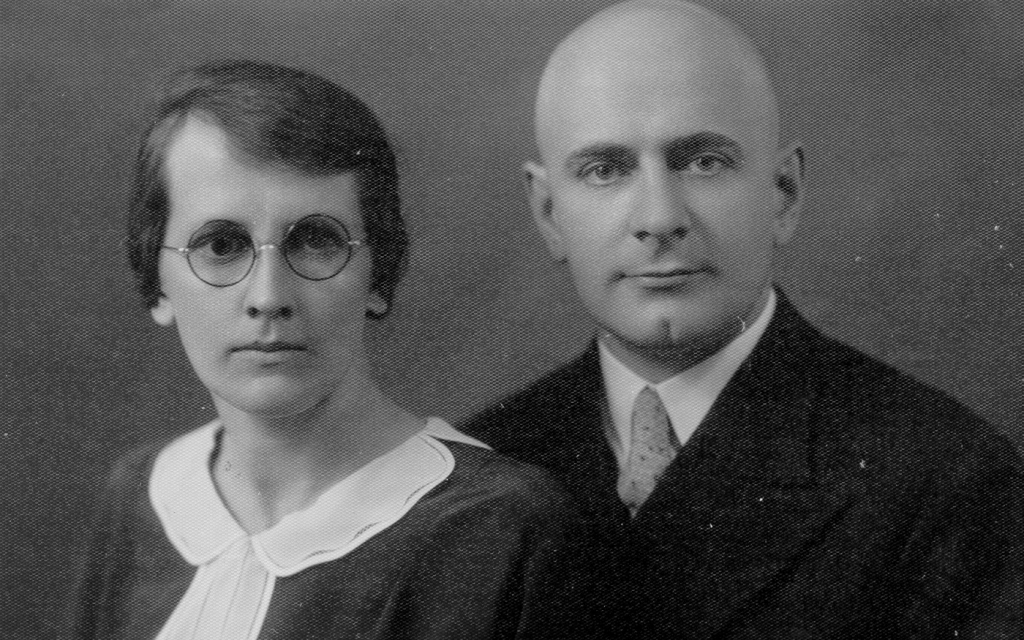Gustav Kinderman: The Faith and Persecution of Eastern European Pentecostals in the 1930s
This Week in AG History–January 20, 1940 By Ruthie Edgerly ObergOriginally published on AG News, 18 January 2024 Gustav Kinderman (1892-1979) was a trans-Atlantic Pentecostal pioneer. He was ordained in 1931 by the German Branch of the Assemblies of God (the … Continue reading

This Week in AG History–January 20, 1940
By Ruthie Edgerly Oberg
Originally published on AG News, 18 January 2024
Gustav Kinderman (1892-1979) was a trans-Atlantic Pentecostal pioneer. He was ordained in 1931 by the German Branch of the Assemblies of God (the organization for German-speaking ministers in the United States). In the 1930s, he served as the secretary-treasurer for the Russian and Eastern European Mission (REEM), a Pentecostal missions organization that was affiliated with the Assemblies of God. He was also a teacher and interpreter for the first Pentecostal Bible school in Eastern Europe, the Danzig Bible Institute.
Kinderman witnessed firsthand the intense faith and great challenges faced by Eastern European Pentecostals. He regularly shared stories of these Eastern European pioneer Pentecostals with American audiences. Kinderman helped facilitate the deepening of relationships between American and Eastern European Pentecostals during an era when political and economic tensions often prevented much contact between people from these nations.
Danzig Bible Institute was created in 1930 to train ministerial students from 12 Eastern European nations to provide leadership in the region’s growing Pentecostal movement. Danzig was chosen as the location for the school because the independent city-state enjoyed relative freedom under the Treaty of Versailles. Neighboring countries — including Germany, Poland, and the Soviet Union — were experiencing political turmoil and a lack of religious freedom. However, as tensions mounted in the region, the school was forced to close in 1938 after only eight years of existence.
Kinderman and his family returned to the United States and, in late 1939, he shared reports at Central Assembly in Springfield, Missouri, about the developing situation in Poland, Germany, and Russia. His address was reprinted in the Jan. 20, 1940, issue of the Pentecostal Evangel.
Kinderman told of one trip to visit churches, arriving on the train at 2 a.m. He was greeted at the station by the young people of the church singing. Upon arriving at the meeting place at 3 a.m. he tried to sleep before the meeting but was interrupted by the door to his room opening and shutting. Even though it was 5 a.m. the believers were so anxious to hear the message that they kept coming in to see if the preacher was awake so the service could begin. They held the first service from 8 a.m. to 10 a.m., the second from 11 a.m. to 5 p.m., and third from 6 p.m. to 2 a.m.
When the service was out early in the morning, Kinderman caught the train to the next place he was to preach the gospel message. Upon arriving there, he noted a lady who looked familiar. He asked where they had met. She replied that he had seen her the day before at the meetings. He asked how she had gotten there so quickly. She replied, “I walked.” It was about 50 miles, and she had walked all night and through the next day to hear the gospel message preached again. Why? Because, Kinderman noted, there is “a desire in their hearts to know our Lord and Savior.”
Kinderman remarked that he could preach all day and, when there was a break, people would bring their Bibles and point to passages asking, “What does this mean?” They had great hunger to know the truth of the gospel.
In spite of this great hunger for God, Kinderman reported the “present war and the seizure of Poland has brought about a condition which lays upon our hearts a burden of prayer … we don’t know what has happened now to these dear saints.” He reported that they had not received “a single letter from any in Poland who are under the Russian government.” Kinderman’s pastoral heart can be heard when he reported, “it is cold over there and we know not their circumstances.”
The information Kinderman was able to gather was not encouraging. One student was arrested and forced to walk three days to a camp with nothing to eat except the grass on the side of the road. When the student grew faint, he was stamped to death. Another report came that the sister who served as the school cook had been brutally murdered along with her parents. Another student was murdered when he came to the defense of his wife, who was beaten by Polish soldiers. The woman’s father and brother were also killed when they came to her aid.
Kinderman remarked, “these conditions should cause us to be quick to obey the Lord’s command” to go into all the world and preach the gospel “and to pray for those who obey such a call … We are glad we worked in Poland while the door was open.” He expressed confidence that the students “will not stop preaching … because Christ has done so much for them.”
Kinderman ended his article with a plea to the American congregation: “Jesus did not come just that we might be saved and settle down to a life of ease and pleasure. He came that all men everywhere might be … saved, and that the work of the devil might be destroyed. Let us bear our share of the work and earnestly pray for our brothers and sisters in Eastern Europe.”
Read Gustav Kinderman’s full report, “The Pentecostal Work in Eastern Europe Today,” on page 6 of the Jan. 20, 1940, issue of the Pentecostal Evangel.
Also featured in this issue:
• “Building A Christ-Honoring Sunday School,” by Marcus Grable
• “Character Unrestrained,” by R.D.E. Smith
• “Lessons in the School of Prayer in South Central Africa,” by A.W. Bailey
And many more!
Click here to read this issue now.
Pentecostal Evangel archived editions courtesy of the Flower Pentecostal Heritage Center.
Do you have Pentecostal historical materials that should be preserved? Please consider depositing these materials at the Flower Pentecostal Heritage Center (FPHC). The FPHC, located in the Assemblies of God national offices, is the largest Pentecostal archive in the world. We would like to preserve and make your treasures accessible to those who write the history books.
Flower Pentecostal Heritage Center
1445 North Boonville Avenue
Springfield, Missouri 65802 USA
Phone: 417.862.1447 ext. 4400
Toll Free: 877.840.5200
Email: archives@ag.org
Website: www.iFPHC.org
